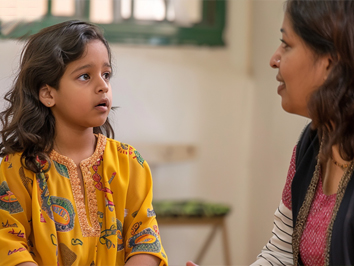
Clinical Psychologist vs. Counseling Psychologist
Clinical Psychologists
Primarily, clinical psychologists will be diagnosing mental health conditions and conditions that may be caused by autism or other special needs in developmental or neuropsychological. Their job goes as follows : .
Assessment & Diagnosis:
They do a detailed assessment on the child's cognitive, behavioral and emotional profile. That could include standardized testing, observation and taking developmental history.
Evidence-Based Interventions:-
They targets specific problems, for e.g., anxiety, frustration and social skill deficits (cogni- or play-based) adapted from CBT (Cognitive Behaviour Therapy)technique or other therapy specially Tailored for the children.
Behavioral Management
Clinical psychologists identify functioning patterns and aim to create strategies for reinforcements of behaviors, as well as management of obstacles that may take place in the everyday life.
Counseling Psychologists
Counseling psychologists, for example, focus on emotional support, coping techniques and social-emotional learning. Their work includes:
Emotional Guidance
They create space where children can discover and share their feelings in a totally safe manner. With counselling available in the forms of talk therapy, art therapy or play therapy children are all able to understand and manage their feelings in a supportive environment.
Family and Parent Counseling:
This line of work is often directly anchored with parents and caretakers, teaching them how to communicate better and manage their stress that could be related with child’s behavior or even the structure a supportive home environment. A Collaborative approach acknowledging with what we try to provide in early childhood for the emotional behavioral needs of children.
Social Skills and Coping Strategies:-
These professionals support children through structured modules of sessions aimed at building confidence, improving interpersonal skills, and learning resilience when facing a challenge.
How Psychology Therapy Works
The following systematic, individualized process are used in Psychology therapy for Autistic children/ children with special needs
1. Initial Assessment and Evaluation:
A. Observations & Standardized Testing:
In clinical settings; schools; extrinsically through play if need be —
some supplemented with standardized tools used to measure cognitive status,
Emotional; emotional overlay; & behavioral functioning.
B. Acquire Extensive Background Information:
Informative from parents, teachers and caregivers provide contextualization
and establish baseline for child strengths and challenges.
2. Setting individualized goals :
Setting Short-Term and Long-Term Goals: Collaboratively crafted goals to focus on particular challenges that you want to work on, regarding things such as emotional regulation, social engagement, behavior etc.
3. Interventions Techniques .
Therapeutic Sessions
Add play therapy of sessions, RolePaly ,cognitive-behavioral techniques
or group sessions that emphasize social skills.
Integrating Strategies
Kids developmental level is the base of adaptation of strategies. Playing
is one such appreciation with cognitive behavioral intervention done ideally
for the younger kid or who have limited verbal skills.
4. Ongoing Monitoring and Adaptation:
Frequent re-evaluations and adjustments:
Performance is tracked via follow up evaluation, other feedback (parents,
educators etc.) and behavior change
Family Involvement
Parents get suggestions on how to apply reinforcement in the home so you
never stop practicing outside of the clinic.
When Do You Need Psychology Therapy?
Psychology therapy is helpful when :
The Signs of Emotional and Behavioral Problems Start To Appear In Early
Childhood
Child become clinically anxious, socially avoidant or behaviorally difficult such that it impacts every day function
Difficulty in socialisation and communication:
Issues with interpreting social information, managing emotional reactions
or connecting with peers might be telling you its time for professional
help.
Concerns of the Parent or Caregiver:
If parents notice increased stress, for anyone involved including both
child or when the child seems to be unable to cope in a few different social
situations at school.
Comorbid Conditions
Children with special needs can have comorbid problems (e.g., Attention
Deficit Disorder [ADD] or mood disorders) as well Psychological therapy
offers adjunct support that addresses this convergence of problems by providing
intervention to target specific ones.
Expected Outcomes for Parents
Parents of autistic or special needs children investing heavily in psychological therapy for their child, can get numerous priceless benefits such as:
Enhanced Emotional Regulation:
Introducing techniques for managing anxiety & frustration in children,
makes for the child stress free situations.
Social Skills Become Better:
Upon practice and with the support of a trained psychologist, children
frequently exhibit enhanced social exchange, more appropriate communications,
and readiness to play in groups.
Behavioural improvements:
Stimuli based behavioral management leads the way to decreased disruptive
behavior, facilitating more harmonious home and school environment
Increased Independence and Self-Advocacy:
with increasing child competence they will be able to advocate more, for
themselves and participate in conversations about their care .
Supportive Family Dynamics:
Counseling teaches parents and caregivers to have skills, a stress reduction
techniques, good communication, a nurturing home environment
Psychologists, both clinical and counseling are the pillars of an understanding and supportive environment that autistic children & their peers with special needs will need so they can grow up to get quality Life. Through detailed evaluations, specific outcome goals and specific targeted therapeutic interventions, this psycologists teaches kids how to regulate their emotions, behaviors, and the ways in which they communicate. Look forward to the child’s emotions of regulation, improved social skills and behavior; the family ties together to better support those changes.
What Parvarish Do ?
Parvarish Help the parents and family to give support to find other services which offers added benefit by merging multidisciplinary support. Being a member of Parvarish family we help to get along with use of psychological interventions in conjunction with educational support, occupational therapy and speech therapy as a multidimensional approach to the developmental domains of children. . These combined efforts can spark long-term growth, ensuring the child receives balanced assistance across all facets of life. Also Parvarish helps in exploring the community support groups or parent training you can do to see yourself advocating and supporting your child with what he/she needs to continue progressing.
